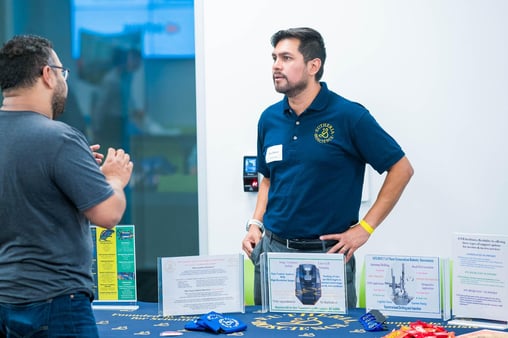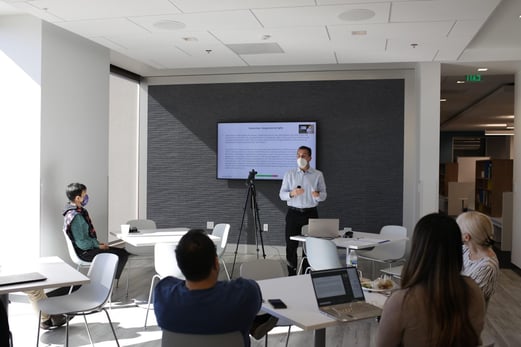An internship is when an advanced student or graduate gains supervised practical experience for a short period, usually in a professional field. Most internship opportunities are designed as college internships, geared toward college students, and meant to be undertaken by continuing university students. These internships may not always require formal work experience, but rather exposure to a particular field of study, grade point average, and acquired skills. If participating in an internship you will likely be compensated for your time working and can speak about this experience for future career opportunities and positions.
An internship is valuable to your professional development and growth in your field. An internship opens up new opportunities that a classroom does not offer. Some skills that you might learn from an internship include practical learning, applicable versus theoretical knowledge, and career growth. All these skills come together and contribute to an agile worker, thus making you marketable for other positions. An advantage of having experience with the company can even turn into full-time job offers after. According to the National Association of Colleges and Employers (NACE), seven out of ten interns are offered return positions as full-time employees. We asked a few past interns what their experience interning was like.
🔬Hear: Other's Experiences
Now that you know what a college internship is and its importance to your resume, you might be interested in securing one. Finding an internship begins with using campus resources. The great place about a college campus is that it offers many opportunities to expand your network and attend events that specifically cater to internship opportunities. Events to look out for might include advertised industry nights, career fairs, job and internship fairs, recruitment events, and guest speaker seminars. These group events are much larger, but if you bring your resume and practice your elevator pitch, leaving an impression for later could be valuable. If you want to narrow in and expand your internship connections college campuses also offer resources. These resources might be through club connections, career centers, professional development workshops, campus scholar programs, or web-based applications. It sounds like a mouthful, but let’s break down each recourse and how you might leverage each, thus taking optimal advantage of them.
Industry Nights
Industry nights, career fairs, and recruitment events all offer ample opportunities to network with individual companies. If you cannot attend these events in person consider attending these events through online platforms. Regardless of your method of attendance, schools host different industry opportunities where you can speak to individuals at the company. These representatives could be direct hiring managers or those working in Human Resources. With the company, you can interact with its current employees and learn more about what the company does, specific positions, and LinkedIn contacts. While speaking to these individuals, you might even decide to stay in touch and start connecting with them by welcoming them into your network. If you decide to attend an industry night, career fair, or recruitment event, take plenty of copies of your resume and have an elevator pitch ready. These events could have large lines, but your goal is to interact with the recruiters and capture their attention. On average, don’t spend more than 2 to 3 minutes interacting with the company. During this time spend roughly 45 seconds introducing yourself. Following your introduction, your goal is to learn more about the company. The information provided by the company is valuable because they might share what kind of employee they are looking to hire. You could also learn more about their hiring process. If you don’t receive this information, ask these questions so you can better align yourself with the company. Remember that every recruiter you speak with is an opportunity to practice your professional etiquette and mannerisms. Start by speaking with companies you are less interested in. Slowly progress and save your prioritized companies for last. By the time you get to the company you are most interested in you will be prepared to give your elevator speech, ask the questions you want to ask, and appropriately hold a conversation that will make you stand out.
🔬Read: How to Write a Winning Elevator Pitch

Seminar Events
Seminar events are large department or college campus-wide events where guest speakers get invited to speak about their work. Sometimes these guest speakers are founders of companies, investors, well-known industry professionals, or world-renowned professors. If you hear about any of these seminars it is strongly encouraged to attend. Some industry panelists and guest speakers have even shared that “These seminars should be valued, but are often under-attended.” Students don’t think there is something to gain, but the knowledge they offer from their experiences is worth the time.
When you attend seminar events you can stand out. Start by introducing yourself to the guest speaker, but note that these events focus on the speaker as the main event. The purpose of these events is to share how they contributed to their field. They are the main event and you are the attendee or the audience. Introducing yourself and engaging with their conversation by asking questions is the best way to introduce yourself without drawing the attention away from them. Ask the guest speakers questions about their work, time in the industry, and journey to where they are now. Discussing their work and experiences with them will help facilitate more conversations and additional discussions about intersecting topics. If you feel comfortable enough, connect with them and reach out in the future.
🔬 Find out: The Importance of Networking in College

Career Centers
Apart from campus-organized events offered through campus resources, there are also amenities. It is fair to say every school is different, however, there are similar amenities that you can look out for. Begin by looking for your school career center. A school career center tends to offer a list of events hosted by the center, both on and off campus. These events are similar to job fairs and recruiting events that were mentioned above, In addition, to the more common events there are also smaller talks geared to connect you with the industry, To prepare students for these events, there are also one-to-one services to help individuals with their resumes, application process, and interview tips.
🔬Learn About: Interview Preparation
Using the career center is simple. Start by navigating your campus career center site for the different resources offered. Commonly found resources might include a list of their key events which lists the job fairs, workshops, and strategy sessions. Some schools also offer exclusive access to job and internship postings. When you interact with the career center, ask which resources are available. There are group sessions they conduct, walk-ins to receive information, and some campuses will offer one-to-one sessions. I encourage students to schedule one-to-one appointments because it encourages developing professionals to spend time finding a position that fits them. After finding these positions, spend considerable time applying, providing a resume, and practicing for the interview.
Workshops
Workshops are another great way to stay connected with the internship hunt. Workshops for internships, resume building, business practices, cover letter writing, and creating LinkedIn pages are all offered through campus support systems. These workshops aim to help current college students adapt their professional development skills and transition into the industry world.
When using the diverse set of workshops, use the career center calendar to keep track of anticipated dates. There are generally only a few large group workshops during the school year. If you plan to attend a workshop, come with a resume that is broadly already made. The best way to leverage your time in these workshops is to receive feedback on all your application materials, hence you need to attend the workshops with a clear start of the process. From here, take away tips from the workshop to polish your documents and make any corrections. Workshops are the perfect place to polish your resume because you can also have others attending the workshop review your resume. Even if others look at your resume at the workshop, once you have completed your part, schedule one-on-one meetings and distribute your resume to more people who can give you feedback. Take their feedback and continue to make edits until you have dedicated ample time to a perfect resume. Always remember that if you miss a workshop or a specific topic you wanted to attend there is never a need to worry. There are always one-to-one sessions or other workshops offered through campus clubs and programs.
Scholar Programs
Scholar programs are another great way to get in touch with internship opportunities. Scholar programs are usually open to individuals part of specific programs or on-campus organizations and clubs. These programs are offered to students from specific backgrounds, associations, or affiliations. Some programs are collegiate-wide and exist as campus chapters, while others are dedicated and created by specific college campuses. Programs you might look for include the Society of Women Engineers (SWE) or Beta Gamma Sigma (The business honor society). These programs want to help a select cohort through their college career by providing resources to their field of study. These programs exist to benefit and honor those in their respective field. If you qualify for these programs, then you might also have access to resources provided by the specific program.
If any of these sound familiar to you, reach out to your organizations and clubs and ask about any professional experiences they offer. Make a list of these events and keep an eye out for announcements that are open for your club to attend. These events go beyond speaking panels and industry nights because organizations will arrange company visits and chats with professionals from specific companies. Since these events are geared towards specific groups it is good to attend because attendance is smaller so your chances of interacting with the guest speaker and being remembered are higher.
Web-Based Applications
Campuses and industries are also interested in advancing future careers, therefore, multiple investments and sponsored deals are made between campuses and online recruiting platforms. These sponsorships are meant to support alumni and students in their job search. Campuses will offer access to plenty of web-based applications such as a handshake, indeed, and LinkedIn Job Search. Software companies such as these use this technology to help you easily connect with employers. Once you have these contacts it is easier to source jobs, internships, event information, and on-campus recruitment opportunities. Being connected to the job market through your campus is an advantage because you can create a profile and grant access to your resume and interests. Employers can also use these different platforms as a recruitment tools. With your resume posted, recruiters can easily verify qualified candidates for open positions and manage on-campus recruitment activities.
Assuming you want to use all or one of these platforms, begin by creating and setting up your profiles for the different accounts. Always upload your educational background, any previous work experiences, as well as your skills. On these platforms, you can also identify your interests and set notifications for positions that align with your job interests. For example, I would identify that I am a biomedical engineer, thus I will be more interested in positions in either biotechnology or biomedical devices. The technology works to filter positions relevant to you and makes suggestions accordingly.
By taking advantage of each opportunity and strategizing to utilize each one, you can increase your chances of finding an internship. After all, multiple professionals in the industry share that the best way is to leverage your existing network. Increasing your chances of interactions expands your network and can lead to more referrals, thus amplifying and strengthening your presence in the field. Whatever route you choose, the most important point to remember is never counting yourself out of an opportunity. As my mentor once told me “The worst answer you can get is a no, but most of the time you will learn something new.” 
Download The Ultimate Guide to Wet Lab Incubators in Southern California, a handbook to assist life science start-ups through the entire decision-making process to find wet lab space.
Download Now